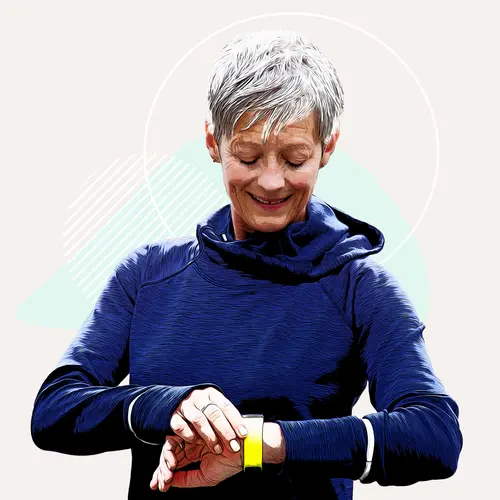The science is clear: Eating the right foods can lead to a longer, healthier life.
But some people find it harder to eat right as they get older for many reasons. Maybe they don’t have much of an appetite. Maybe they have trouble cooking or eating. Maybe they don’t know what’s healthy. Or maybe they do and just don’t like the idea of kale.
“You know what? You can live a long, healthy life and never eat a piece of kale,” says Cheryl Rock, PhD, a professor of family medicine and public health at the University of California, San Diego School of Medicine.
She’s all for finding healthy food that you like and building on that.
“If you’re eating foods you like, then you’re more likely to stick with it. You won’t force it down for 4 days and then go out for a double cheeseburger,” Rock says.
But it’s more than just finding the right foods. Michele Bellantoni, of the Johns Hopkins University School of Medicine, points out that you need to eat them in the right amounts, too.
“It looks like the optimal calories [for most older adults] will be 1,800 [a day],” she says. “And for successful aging, we think about the entire body, rather than just specific organs.”
Many foods are especially good for certain parts of your body. Bellantoni suggests splitting those 1,800 calories up into proteins for your muscles, calcium for your bones, and a basic heart-healthy diet.
That approach can do a lot of things for you.
It Can Help Your Heart
A basic heart-healthy diet can help you control your weight. That’s important because more than a third of people 65 and older are obese. That can lead to diabetes, some cancers, and heart disease.
A heart-healthy diet is one that includes:
- Fruits and vegetables
- Whole grains
- Low-fat dairy products like yogurt and cheese
- Skinless poultry
- Lots of fish
- Nuts and beans
- Non-tropical vegetable oils (olive, corn, peanut, and safflower oils)
Salmon and other fish, like trout and herring, are high in omega-3 fatty acids, which help lower your chances of heart disease and may help with high blood pressure, among other things. Aim for two servings a week.
The fiber in veggies and whole grains also can help make you less likely to have cardiovascular disease. And it aids with digestion and may help keep you regular, which can be a problem for some older adults.
No single food is going to help your heart. You need a complete, healthy diet.
“If you’re eating a lot of fish but, in addition to that, you’re living on ice cream and candy and stuff like that,” Rock says, “it’s not going to save you.”
It Can Help Your Brain
A loss of memory, a big concern among some older adults, has been linked to a lack of vitamin B12, among other things. You can get that in:
- Meats
- Fish
- Milk products
- Some breakfast cereals
Alzheimer’s disease has been linked to chronic inflammation, which can be caused by foods like white bread, french fries, red meat, sugary beverages, and margarine.
Scientists are still studying the link between some foods and brain health.
“I would not want to identify a specific food that prevents memory loss. I probably would tell someone that if you want to be functioning well, then some fruits and antioxidants will do better for you than another slice of cake," says Adam Drewnowski, PhD, director of the Nutritional Sciences Program at the University of Washington.
Antioxidants, found in many vegetables and in fruits like blueberries, help ease inflammation. They also help you get rid of some damaging things called free radicals that are made when your body changes food into energy.
Again, it’s important to realize that good brain health may be as much about what you don’t eat as what you do.
“Your brain runs on blood flow, just like your heart,” says Rock. “So if you’re eating a lot of saturated fats, it makes it less likely that you’ll have those nice clean arteries to supply that brain tissue with blood.”
Try to get tomatoes, blueberries, green leafy veggies like spinach and kale, turmeric, and nuts (especially walnuts) into your diet. And those omega-3 fatty acids, found in salmon and other oily fish, are inflammation fighters, too.
It Can Help Your Muscles
They’re always breaking down and getting built back up again -- that’s the way your body works. As you get older, you need more protein for that rebuilding process.
“If you don’t eat enough protein, you’ll be breaking down more than you’re rebuilding,” Rock says.
Low-fat or fat-free yogurt, cheese, milk, lean meats, fish, other seafood, and beans can help with that. And eggs are an excellent source of protein, too, and they don’t have the saturated fats that meat have. Don’t worry about the cholesterol in your eggs, Rock says. Your body doesn’t absorb it well.
It Can Help Your Bones
Older adults need calcium because it boosts healthy bone growth. Yogurt, low-fat cheeses, and milk are good sources.
You’ll want to be careful, though, because too much can cause constipation. Talk with your doctor or dietitian about what would be best for you.
Getting enough vitamin D is important, too, because that helps your body use calcium. But that’s not always easy.
“The risk for low vitamin D in older adults, that’s kind of a challenge because it’s not like there’s lots of foods that are high in vitamin D,” says Stephen Anton, PhD, from the department of aging and geriatric research at the University of Florida.
Calcium and vitamin D are in fortified foods, fish like salmon, and dairy products.


